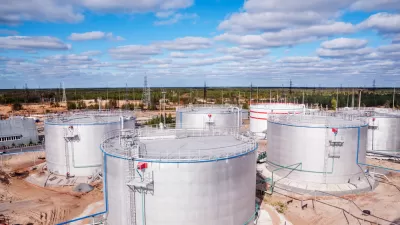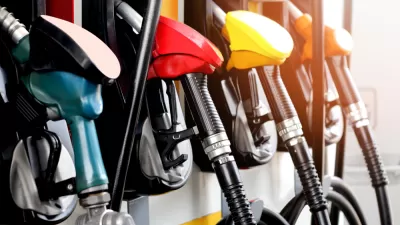Gas prices have risen dramatically and continue to rise, with oil topping $110 per barrel. How are we paying for it, and who benefits? The News Hour's Ray Suarez interviews oil expert Lisa Margonelli for answers.
Oil now tops $110 barrel – and there are dire consequences not readily apparent.
"Right now we're spending more than $1.2 billion a day on gasoline alone in the United States. And about five years ago, we were spending less than half that. So now we're spending $600 million or $700 million a day on getting no more than what we were getting in 2003."
"We're paying for it on credit cards. We're changing the way we shop at the grocery store, selecting cheaper products, yet we're barely taking our foot off the gas pedal."
So who benefits from the dramatic price increases?
"No very much of it goes to your local gas station, that's for sure. Those guys make about three cents a gallon."
Is the additional revenue benefiting the big oil producing countries?
The money has "contributed to kind of a cycle of corruption and poverty. It doesn't really grow a real economy...Recent studies have shown that in both Venezuela and Iran, people are feeling that they have kind of a falling standard of living, even after five years of dramatically rising oil prices."
"Worse yet, the price increases has led to a black market, where oil is stolen from pipelines, or even tankers themselves, and much of it goes to guns", leading to violence and instability.
[Editor's note: Written transcript, RealAudio, Download and streaming video available.]
FULL STORY: Tracking Oil's Journey From the Pipeline to the Pump

Americans May Be Stuck — But Why?
Americans are moving a lot less than they once did, and that is a problem. While Yoni Applebaum, in his highly-publicized article Stuck, gets the reasons badly wrong, it's still important to ask: why are we moving so much less than before?

Using Old Oil and Gas Wells for Green Energy Storage
Penn State researchers have found that repurposing abandoned oil and gas wells for geothermal-assisted compressed-air energy storage can boost efficiency, reduce environmental risks, and support clean energy and job transitions.

Placekeeping: Setting a New Precedent for City Planners
How a preservation-based approach to redevelopment and urban design can prevent displacement and honor legacy communities.

San Francisco’s Muni Ridership Grew in 2024
The system saw its highest ridership since before the Covid-19 pandemic, but faces a severe budget shortage in the coming year.

Colorado Lawmakers Move to Protect BRT Funding
In the face of potential federal funding cuts, CDOT leaders reasserted their commitment to planned bus rapid transit projects.

Safe Streets Funding in Jeopardy
The Trump administration is specifically targeting bike infrastructure and other road safety projects in its funding cuts.
Urban Design for Planners 1: Software Tools
This six-course series explores essential urban design concepts using open source software and equips planners with the tools they need to participate fully in the urban design process.
Planning for Universal Design
Learn the tools for implementing Universal Design in planning regulations.
Heyer Gruel & Associates PA
City of Moreno Valley
Institute for Housing and Urban Development Studies (IHS)
City of Grandview
Harvard GSD Executive Education
Salt Lake City
NYU Wagner Graduate School of Public Service
City of Cambridge, Maryland





























